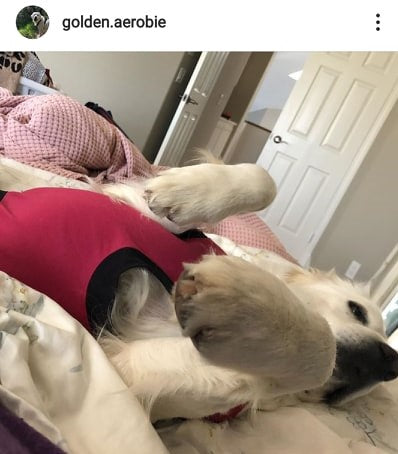Dear readers,
Your dog just had surgery, and now he’s acting weird. Below is a fact sheet regarding some common behaviours of dogs post-operatively. Hopefully they will help you to understand why these behaviours are occurring, and what you can do about them.
Depression
If your dog seems depressed after surgery, there could be a few causes. One cause may be that your dog is still metabolizing opioids or NSAIDS (non-steroidal anti-inflammatory drugs) used to control pain during and after surgery. The pain medication used while your dog was in hospital, as well as pain medication sent home, can often cause signs of depression. Your dog is likely to be lethargic and less active during the recovery period.
Additionally, you are likely restricting your dog from participating in activities that he or she enjoys while in recovery, at the advice of your veterinarian. Walks and play must be limited immediately following surgery so as not to cause extra trauma to the incision while it heals. Your dog doesn’t understand why these activities are being restricted, and they may have feelings of boredom or a lack of enrichment. Fear not! It is only temporary!
In the meantime, offer your dog some extra TLC. Extra cuddles, tasty treats and special privileges can go a long way in helping your canine friend to feel a bit better while they recover. Try to get creative on finding other ways to provide your dog with enrichment. Example: Fill a kong with peanut butter* (ensure it does not have xylitol or artificial sweeteners as these can be toxic to dogs), and freeze it. Freezing the kong allows for the treat to last a little longer while your dog enjoys devouring it.
*Check with your veterinarian that your dog is okay to receive peanut butter as a treat in case they have any allergies or dietary restrictions.
Panting
Panting or opened mouth breathing while at rest following surgery can mean a couple of things. It can be caused by anxiety. Your dog had a long, hard day, and it may take some time for them to relax and settle. After some time, this should ease.
Panting can also be your dogs way of showing you that they are in pain. It is a good idea to assess your dog for pain if they are persistently panting after surgery. Other signs of pain include hunched posture, vocalization, hiding, reluctance to be held or picked up, uncharacteristic aggression, and restlessness. If you suspect that your dog is feeling painful after surgery, it is a good idea to report this to your veterinarian. They may prescribe extra pain control, or they may want to asses your dog for complications. Re-checks like this do not typically cost extra so it is worth reaching out to your vet. Better safe than sorry, I always say!
Whining
Whining can be caused by any combination of anxiety, restlessness, pain, or frustration. As with above, assess your dog for pain and offer them extra TLC and find creative ways to offer them enrichment while they recover.
Inappetence
So your dog has come home from surgery and they don’t want to eat. For the first 12 hours following surgery, it is not uncommon for dogs to feel nauseous. While nauseous, they are not likely to want to eat. It’s okay to give them a little bit of extra time to develop their appetite. It is also sometimes a good idea to offer more frequent, small meals during recovery rather than a couple of large meals a day.
If your vet allows, you may also offer them something extra special like canned food, or pure pumpkin to stimulate their appetite. Just be warned, your dog may become accustomed to fine dining and give you attitude when it is taken away after recovering!
Prolonged inappetence into the next day and beyond should be reported to your veterinarian.
No poop!
Regarding bowel movements, it is likely that your dog fasted the night prior to surgery. After fasting, it can take some time for their gastrointestinal tract to catch up and produce a bowel movement. However, they should be urinating normally, especially if they have been receiving intravenous fluid therapy throughout the day. They may even urinate more!
*While there are some recurrent behaviors in dogs post-operatively that are not necessarily a cause for concern, it is important to note that any prolonged abnormal behaviour should be reported to your veterinarian.
Sincerely,
Shelby, RVT and retired surgery technician
PHOTO CREDIT: @golden.aerobie, Thanks for letting us use your model pic, you beautiful girl.


Leave a comment: